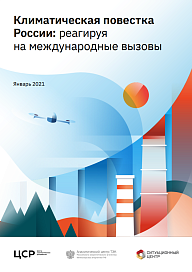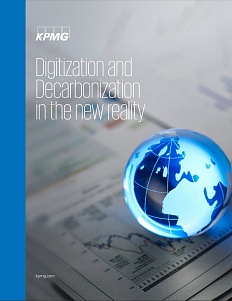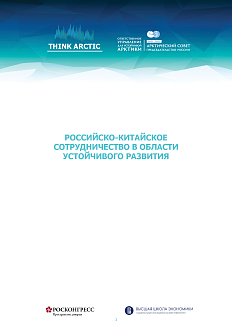The report prepared by the Center for Strategic Research in cooperation with the Analytical Center of FEC of REA of the Ministry of Energy of Russia and the Situation Center (GC Seldon) examines the issues of the climate agenda, analyzes the key trends of the global climate agenda and evaluates the challenges that these trends pose to the Russian economy.
The Roscongress Foundation presents the salient points of the publication accompanied by fragments of broadcasts of relevant panel discussions from the business programme of international events held by the Roscongress Foundation.
The climatic situation in the world is worsening, which creates new challenges for Russia.
According to the World Meteorological Organization, 2020 will be one of the three warmest years on record. This shows that environmental and climatic problems, issues of global warming are an acute challenge in today’s world. Russia is one of the largest emitters of greenhouse gases in the world, which leads to increased attention from the international community to the country in achieving the country’s climate goals. And despite the fact that in the long term Russia has significantly reduced the amount of emissions (in 2018 there were 30.3% fewer greenhouse gas emissions than in 1990), recently the amount of emissions has been increasing, and Russia’s goal, for example in the Climate Action Tracker (a special index developed by global consulting companies) is characterized as «critically insufficient». Thus, this situation may pose a challenge to Russia’s image as a environmentally responsible country. The authors of the report also highlight the following external climate challenges to Russia’s economy:
— the challenge of improving data quality for international comparisons,
— the challenge of reducing the demand for traditional energy resources,
— the challenge of stricter requirements for Russian carriers on international markets,
— the challenge of the emergence of climate restrictions in international trade and discrimination against Russian products,
— the challenge of eliminating or limiting support for low-carbon energy sources such as nuclear power and large scale hydropower.
The report also notes that the strengthening of the climate agenda in the world generates a growing demand for the disclosure of carbon reporting by business and limited opportunities to attract funding for carbon-intensive projects.
Russia is taking a number of steps to address climate issues at both the international and national levels.
Russia actively participates in the formation of international climate policy: the country is a party to the UN Framework Convention on Climate Change, the Kyoto Protocol, the Paris Agreement, and international treaties on the protection of the ozone layer.
Active actions are also observed at the national level. Strategic documents in the field of counteraction and adaptation to climate change are being developed, as well as measures aimed at reducing greenhouse gas emissions, and a goal for their reduction in 2030 is set, the sphere of «green finance» is actively developing. Consideration of the rules for the introduction of mandatory carbon reporting continues, and the Concept of the formation of a monitoring, reporting and verification system of greenhouse gas emissions in the Russian Federation was adopted in 2015. Russia’s climate agenda focuses on the following areas: measures for adaptation to climate change, unlocking the potential of energy efficiency, protection and restoration of forests, and encouraging the development of alternative renewable energy sources.
In order to maintain the competitiveness of Russia’s economy, it is necessary to proceed to decisive actions in the field of climate policy in general and carbon regulation in particular.
The report notes that it is important for Russia to move to decisive actions in the development of climate policy measures and thereby maintain the competitiveness of the Russian economy. The sector of carbon regulation in connection with the planned introduction of a transboundary carbon mechanism in the EU, which will take the problem of carbon regulation to the international level, stands out. Since Russia is the largest trading partner of the EU, which does not have any system of carbon response (carbon taxes or emissions trading), this deprives the country of the flexibility to net payments for greenhouse gas emissions in its territory.
Thus, for a correct response to the situation and full or partial preservation of payments for greenhouse gas emissions, Russia needs to implement a number of measures, including the elaboration of the possibility of development of carbon regulation in Russia, the elaboration of the introduction of symmetrical measures for imports from the EU, the elaboration of support measures (compensations) in Russia for the most affected enterprises and industries.
The research also notes the importance of further work on developing climate policy measures, such as forest regulation, reporting and monitoring greenhouse gas emissions, and implementing directions towards a low-carbon development path.
For more information, see the special sections of the Roscongress Foundation Information and Analytical System: Sustainable Development devoted to global challenges and responses to them; Climate Change and Environment, which provide information on environmental issues.





